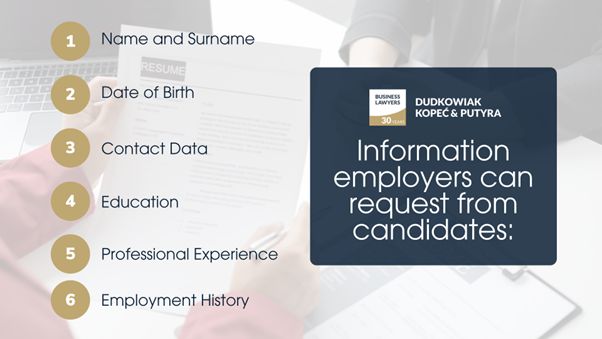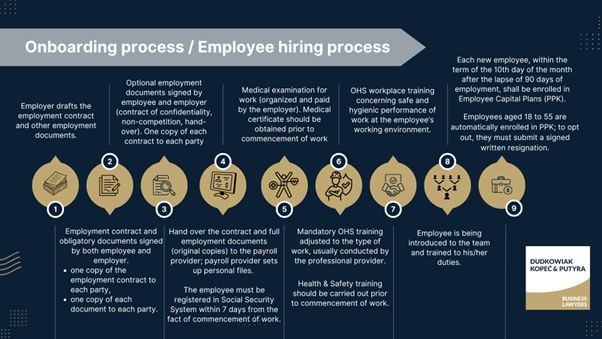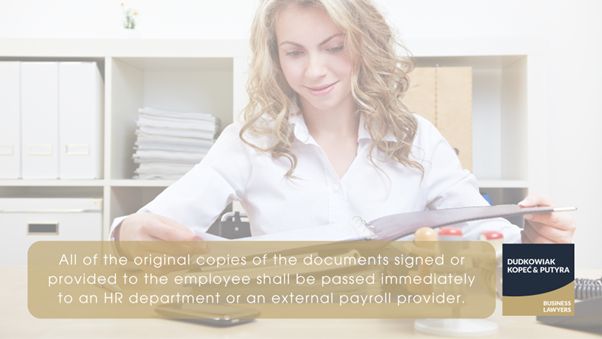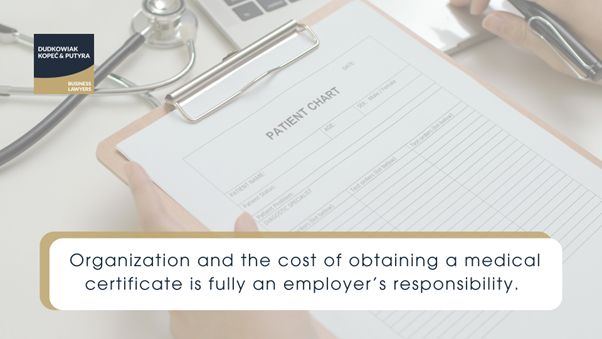- within Employment and HR topic(s)
- in United States
- within International Law, Tax and Corporate/Commercial Law topic(s)
- with readers working within the Business & Consumer Services industries
RECRUITMENT PROCESS
Polish Labor Law does not regulate the content of job advertisements or the procedure of job interviews. Nevertheless, in the recruitment process, the future employer must comply with the principles of equal treatment (non-discrimination) and adhere to the rules of processing personal data of candidates.
Non-discrimination in recruitment and job adverts
When formulating the content of the advertisement and selecting candidates for work the employer shall refrain from criteria based on sex, age, religion, political beliefs or disability. As these criteria are not related to work, they cannot be taken into account when deciding on employment.

Nonetheless, the principle of equal treatment of job applicants is not absolute. The employer may indicate in the job advertisement a discriminative criterion if it is able to justify its importance for a given type of work.
The employer must therefore demonstrate objective reasons for applying a criterion that is in principle discriminatory. Therefore, differentiation of job candidates for reasons such as the type of work, conditions of its performance or professional requirements is allowed.
Personal data protection
The scope of the data that can be obtained from a candidate is very restricted. Generally speaking, there are 3 categories of data that can be demanded from the candidates:
- information that an employer has the right to ask from the candidate,
- information that may be demanded if it is necessary to perform a specific work and
- other than the above mentioned personal data.
The employer has a right to require the following information from the candidate:
- name and surname,
- date of birth,
- contact data (at the candidate's choice: email or/and phone number and/or address).
Moreover, if it is necessary to perform work of a specified type or in a given job position, the employer may require a candidate to provide information about:
- education,
- professional experience and
- employment history.

Other personal data of candidates can be processed only if required by labour law or based on the candidate's consent, however, the lack of consent or its withdrawal may not cause any negative consequences.
If the data is "sensitive data" according to art. 9 (1) of GDPR (religion, political views, sexual orientation, health etc.), then an employer is not entitled to ask for such consent, the data should be provided only at the initiative of a candidate (never - at employer's initiative).
As a general rule, employers should obtain information required for the recruitment process directly from candidates. Such information may be confirmed by presenting relevant documents (certificates, diplomas etc.).
Background screening of employees
There are following restrictions in Poland concerning background checks of the candidates for employment:
- Employment history - employers may contact candidates' previous employers only based on a candidate's consent, and solely to confirm data provided in recruitment documents (CV, references) by the candidate. It is not allowed to ask for additional information not provided by the candidate;
- Social media and public registers - so-called "professional" social media profiles such as LinkedIn, or data available in public registers accessible online (such as a National Court Register, a register of entrepreneurs) may be verified during the recruitment process if candidates are informed about it beforehand and give their consent to do so, data from private accounts such as Facebook or other candidates' presence in media, should not be taken into account in a recruitment process;
- Psychological tests - if not required by labour law, such tests can only be conducted based on candidates' consent (which can be withdrawn at any time without negative consequences for a candidate) if it is justified by the job position and does not reveal any "sensitive data" (such as mental health);
- Education - President's of the Personal Data Protection Office (Polish supervisory body according to GDPR) official statement is that employers are not allowed to contact universities to confirm the education of the candidate - diplomas and certificates should be sufficient proof for that;
- Criminal records - employers can only require criminal record certificates from candidates for work if such a right is specifically granted to them by law. For instance - teachers, customs officers, selected employers from the financial sector and employers who provide services to such entities are obliged to provide their employers with a court confirmation of no criminal records (or the employers may obtain them directly from the court register). It is not allowed to process information about the candidates' criminal records on a basis of the candidate/employee's consent - even if they explicitly and voluntarily agree to reveal such data.
The above-mentioned restrictions of background screening refer only to candidates for employees (based on an employment contract regulated by the Labor Code). Candidates for work based on B2B contracts can be examined in a broader scope, including criminal record check, provided that obtaining such information during the background check is justified and necessary to choose the right candidate for a given job.
ONBOARDING PROCESS / EMPLOYEE HIRING PROCESS

Preparation of the employment contract
First step of the onboarding process is preparation of the employment contract for a future employee. An employment contract shall be concluded in writing, although oral agreements are also valid as long as the significant conditions of work are confirmed in writing prior to commencement of employment.
Employment contract shall be drafted in Polish. Bilingual version (Polish + another language) is also permissible and often used when the contract is concluded with a non-Polish national.
Signing an employment contract
As a rule the employment contract shall be concluded in writing. In Poland "in writing" means exclusively a wet signature on a hard copy document. As an exception the signature may be placed in special electronic form i.e. qualified electronic signature eIDAS complaint.
The key disadvantage of the qualified electronic signature form is that both parties must possess such a signature (and this is very rare in the case of employees). Regular electronic signatures provided by numerous worldwide providers are not acceptable.
Therefore, an employment contract signed with a regular "DocuSign" signature (or other type of electronic signature) or signed by one party and sent as a scan via email to the second party will not be acknowledged as concluded in mandatory, written form.
Mandatory and optional employment documents
Mandatory documents handled to each new employee include:
- An employment agreement;
- Questionnaire for employee - special form includes an employee's personal data and information; the questionnaire shall be completed after the conclusion of the employment agreement;
- Personal data processing information clause - obligatory document pursuant to European General Data Protection Regulation (GDPR); it contains information about processing employee's personal data, purposes and legal basis of data processing;
- Work terms & conditions information statement required by article 29 of Polish Labor Code;
- Statement on acknowledgment of internal regulations and H&S regulations - by signing this statement the employee declares that was informed by the employer about work terms and conditions (incl. Work Regulation and Remuneration Regulation), work time, provisions and scope of confidentiality, Health & Safety and fire protection provisions;
- Information on working time systems applicable in the workplace - if the employer is not covered by a collective agreement or is not obliged to issue Work Regulations (i.e. hires less than 50 employees based on employment contracts), working time systems and schedules, as well as the applicable calculation periods of working time are specified in the employer's announcement.
- Statement on having premises and technical conditions enabling remote work and that safe and hygienic conditions are provided at the remote work job position – in case of remote workers.

An employer may decide to conclude some optional agreements with a new employee. Most common optional agreements concluded with employees include:
- Confidentiality contract (NDA) - each employee is obliged to keep the trade secrets of the employer based on the generally applicable provisions of law (Act on combating unfair competition) - in most cases statutory regulation or simple confidentiality clause shall be enough; in case of high management or employees who will access to secured information, it is recommend to sign a separate NDA contract to strengthen the employer's interest protection
- Non-competition during employment period contract - should be concluded as a separate agreement; the breach of non-competition allows the employer to terminate the employment contract without notice period and demand compensation for damage; in case of high management or employees who have access to highly confidential information, it is recommend to sign a separate NDA contract to strengthen the employer's interest protection;
- Non-competition after employment period - this is a contract usually signed with employee who has an access to protected, important information, in the NCA concluded after the term of employment agreement the employee has a right to compensation of a minimum level of 25% of net remuneration received before termination of an employment for a period corresponding to the period of non-competition ban;
- Agreement on entrustment of property - such contract is signed with employees who are entrusted a valuable company property - laptop, phone, company car etc.; under the proper entrustment of property employee is fully liable for any loses (in all other cases liability of an employee is limited to the amount of 3 monthly remunerations)
- Training contract - such a contract defines the rights, duties and responsibilities of the employee in relation to raising his / her professional qualifications (leave conditions, costs of coverage etc.); it allows to impose on the employee an obligation to work for the employer for the period not exceeding 3 years, e.g. for the period of training and, in case of termination of the employment agreement by the employee, allows for reimbursement of training costs incurred by the employer.
- Remote work agreement – contract concluded with employee working entirely remotely or in a hybrid mode, regulates the rules of performing and controlling remote work and the amount of remote work allowance; in bigger companies instead of such contracts employers usually opt for general remote work regulations – they are also mandatory for employers who have more than 50 employees.
Passing document to the payroll provider and set up of employee personal files
All of the original copies of the documents signed or provided to the employee shall be passed immediately to an HR department or an external payroll provider.
Each employer is obliged to store the employment related documentation. Regardless of the form of business activity, the number of employees, personal files should be created and maintained separately for each employee. This obligation is particularly important due to its evidentiary importance in disputes over claims arising from the employment relationship.

Detailed rules for keeping employee documentation (employment files) are included in the regulation of the Minister of Family, Labor and Social Policy on employee documentation. Pursuant to the provisions contained in the regulation, personal files should consist of four parts:
- Part A - recruitment related documents,
- Part B - employment establishment and performance related documents,
- Part C - termination related documents,
- Part D - employee's liability related documents,
- Part E – documents related to checking the employee's sobriety or checking for the presence of substances with a similar effect to alcohol in his body.
An employer may decide whether he wants to keep records in paper or electronic form. To keep employee files in electronic form, employers need software that meets the technical requirements specified in the regulations of labour law and a signature or a qualified seal, because each document must be accompanied by such a confirmation.
Medical examination for work
Each employee must undergo the medical examination and receive a medical certificate stating that he/she is capable of working in a given work position. Work position and description of the conditions of work is placed in the referral which shall be issued by an employer.
Organization and the cost of obtaining a medical certificate is fully an employer's responsibility. Commencement of work by an employee without medical certificate stating his/her ability to perform work on entrusted job position is illegal and may be subject to a fine and impact the employer's liability in case of accident at work.
There are some exemptions from the obligation to obtain medical certificate by the employee i.e.:
- persons employed again with the same employer on the same job position or at the position with the same working conditions, within 30 days of termination or expiry of the previous employment relationship with same employer;
- persons employed with another employer on a given job position, within 30 days after termination or expiry of the previous employment relationship, if they provide employer with a valid medical certificate confirming that there are no contraindications to work under the working conditions described in a referral to medical examinations, and an employer ascertains that these conditions correspond to the conditions encountered at a given job position, with the exception of persons admitted to perform particularly hazardous types of work.

Occupational health and safety training
Occupational health and safety training is divided into initial and periodic training. Initial training is carried out prior to employment commencement, periodic training is carried out from time to time as the labour law may require. The validity of the training is determined by the Regulation of the Minister of Economy and Labor on training in the field of occupational health and safety.
The training is usually done by the professional, external provider. Online training is also available for selected work positions as well as for remote workers (employees working fully or partially remotely). A positively passed test summarizing health and safety training is the basis for obtaining a certificate of completion of the training which must be stored in employee personal files.
Commencement of work by an employee without the completed OHS training is illegal and may be subject to a fine and impact the employer's liability in case of accident at work. Obligation to undergo the training and obtain certificates applies also to regular office workers.
In addition to above - the employees shall also undergo the separate OHS training that is usually done by the manager at a workplace and concerns safe and hygienic performance of work in a given, specific work environment.
Registering new employee in social security system
Each new employee must be reported to social security (ZUS). Depending on the scope of benefits of the employee, the application shall cover health insurance premiums or health insurance premiums and specific social security premiums.
The application must be made within 7 days from the date the insurance obligation arises (i.e. from the moment of commencement of work).

Enrollment in Employee Capital Plans (PPK)
As a rule - after the lapse of 3 months of employment, each new employee in the age of 18 - 55 years shall be enrolled by the employer to a private system of long-term savings - Employee Capital Plans.
Agreement for running a PPK on behalf of a new employee, shall be concluded by the employer no later than by the 10th day of the following month after laps of the 3-months of employment term. As PPK is an opt-out program, in order to resign from PPK, an employee shall submit to the employer a written resignation (hardcopy document with wet signature).
Each new employee, within the term of the 10th day of the month after laps of 90 days of employment, shall be enrolled in Employee Capital Plans (PPK) – unless the employee files a resignation and opts out from the programme.

FAQ - ONBOARDING
Are background checks legal in Poland?
Backgrounds check are possible but within very limited scope. E.g. employers may contact candidates' previous employers only based on a candidate's consent. LinkedIn and similar profiles may be verified during the recruitment process if candidates are informed about it beforehand and give their consent. Data from private accounts (Facebook) should not be taken into account in a recruitment process.
Is criminal background check legal in Poland?
Employers in Poland can only require criminal record certificates from candidates for work / job position if such a right is specifically granted to them by specific provision of law. For most positions it is not allowed and check criminal record certificates even upon consent of the candidate.
What are key onboarding obligations in Poland?
Key onboarding obligations are: signing employment contract, reporting new employee to ZUS (social security), obtaining medical certificate for new employee and arranging health and safety training.
Is medical check mandatory prior to commencing work in Poland?
Yes, medical check (and obtaining medical certificate) is required prior to starting work at any new employer in Poland.
The content of this article is intended to provide a general guide to the subject matter. Specialist advice should be sought about your specific circumstances.



